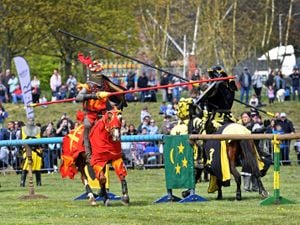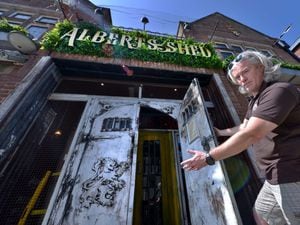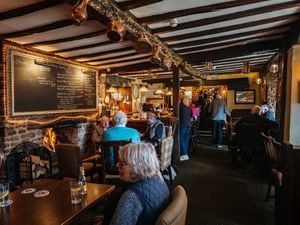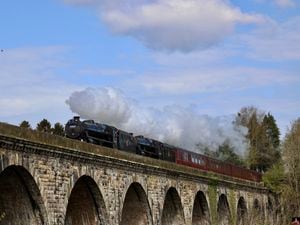Travel review: Lincoln
Writer Sarah Cowen Strong enjoys a break in the historic city of Lincoln
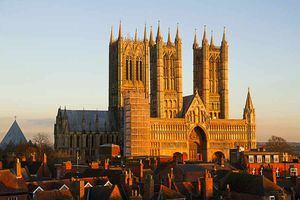
Stone lions, lawns greener than green and lines of national flags fluttering in the breeze.
We're used to the stately uniform of our grander hotels, but never before have I seen one proudly flying the RAF ensign from the top of its roof.
This is Petwood Hotel in Woodhall Spa, just outside the city of Lincoln, which started off as a rural retreat conceived by a wealthy London heiress in the early 1900s, and is now a magnificent hotel in acres of grounds, attracting not only wedding parties, couples and the conference-bound but lovers of military history.
For along the way Petwood became home to none other than the legendary RAF 617 "Dambusters" Squadron of the Second World War – a momentous, fascinating and chilling fact. The house had been occupied from 1942, but when the top-secret dam attacks were being planned and the nearby Woodhall Airfield chosen as the operational base other units were moved out and the officers moved in.
Close your eyes and you are treading in the footsteps of Victoria Cross heroes Guy Gibson and Leonard Cheshire themselves. The Squadron Bar houses a fascinating collection of memorabilia and tributes – letters home and photographs of men just in their 20s, burdened beyond their years with the ovewhelming responsibility of the country's destiny in their young hands.
Add the splendour of the hotel gardens, the luxury of the accommodation, with features such as a hand-carved staircase, four-poster beds, an extensive menu and romantic nooks and crannies, and Petwood is a must for a trip to Lincoln.
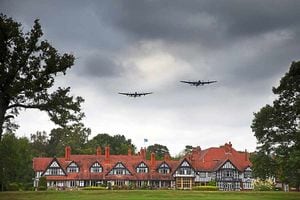
Team it with a visit to the Lincolnshire Aviation Heritage Centre in nearby East Kirkby, which has a Lancaster bomber on permanent display together with personal stories and artefacts and a roll of honour to all 848 airbase crew lost in the Second World War and you'll find it hard to find your way back to 2016. Extend your trip and stay at Washingborough Hall Hotel, just outside Lincoln city and take another journey through time.
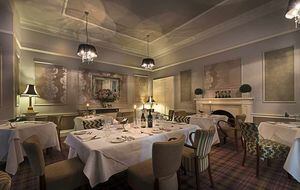
This intimate and homely Georgian delight has seen a chequered past with present-day rooms echoing not only to the steps of one of the richest families in the county, but also churchmen and – quite recently – nightclubbers.
Today the hotel is family-owned and family-cherished. It oozes stye and elegance, with attention shown to detail as well as the guest. We stayed in a beautiful four-poster room, enjoying space, subtle decor and a freestanding bath in the en suite.
After a welcome sundowner on the ample terrace, breathing in the perfume of lavender beds and geraniums we enjoyed a glorious dinner in the high-ceilinged dining room, decorated graciously with garden posies on the tables.
The food was out-of-this-world, reflecting not only cuisine of the finest quality but an understanding of local produce and in-season delicacies.
The menu is constantly changing, but at the moment one of the succulent mains is Poached & Roasted Partridge, Wild Mushroom Farci Choucroute, Thyme Infused Fondant Potato and Bacon Cream while hedgerows have been raided for the Poached Blackberries served with Spiced Cre?me Caramel and Gingernut Biscuits.
Staff are warm and helpful and were only too happy to extol the virtues of Lincoln with us next morning.
The city is breezy and bustling, from the shops on the waterfront up to the medieval streets surrounding the cathedral and castle. Both are must-see destinations.
Take time to enjoy a guided tour of the 12th century edifice – once the tallest building in the world and now one of the largest in the country – and hear about its brush with an earthquake, its very own copy of the Magna Carta and just what the Victorians did to the choir screens.
Leave the castle until after you've toured the cathedral, and then you can admire a bird's eye view of the whole glorious structure from the Norman walls.
We were lucky enough to be there when the castle gardens were ripe with the climbing flowers of the national art installation Poppies: Wave – marking the centenary of the First World War. It was simple, yet emotive and rather fitting in the heart of the county which has played such a key role in military history and has seen more than its fair share of spine-chilling sacrifice. Lincolnshire, a city which almost slips under the radar, must be visited for its vast open spaces, its heritage and its history.
Let's fly the flag for its past and enjoy what it has to offer for the present and what it has up its sleeve for the future.
By Sarah Cowen Strong


